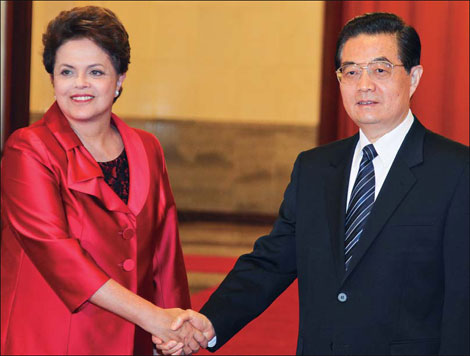China and Brazil forge a common future
Updated: 2011-09-13 07:51
(China Daily)
|
|||||||||||
|
President Dilma Rousseff met with President Hu Jintao when she was in China to attend the BRICS summit in April. Photos provided to China Daily |
'Clean slate' for mutually beneficial relationship
Although China and Brazil share a relationship dating back more than 200 years, even a casual observer would know there was a significant gap in the late 20th century.
From the 1940s both countries were busy forging their own paths and largely ignored what the other country had to offer.
Formal diplomatic relations started in 1974, but the Brazilian business community was frustrated at the slow pace of development in trade relations.
Then quite suddenly China and Brazil began to cooperate on mutually beneficial projects, the first of which was the China-Brazil Earth Resources Satellite Program that built satellites in 1999 and 2002 to provide information on new sources of natural resource reserves.
The relationship began to take on a new dimension in 2004 when China's President Hu Jintao said in his message to the Brazilian congress that both Latin America and China share histories of gaining national liberation, defending independence and in nation building - and that closer China-Brazil ties could foster a new economic strength.
Also in 2004, Brazil recognized China as a market economy and the seed was planted for a massive uptake in trade and investment, although the same Brazilian industrialists that earlier complained of a lackluster relationship soon complained of the reverse - that Brazil was seen as a "one-stop shop" by China.
For its part, the Chinese business community looks at the relationship from a different point of view and sees Brazil's products as a vital resource for their continued growth.
Both countries have a point. China overtook the United States in 2009 as Brazil's largest trading partner and the destination of 12.5 percent of Brazil's total exports.
To a certain extent, China has financed Brazil's recent booming economic growth.
Some economists point out that if commodity prices remained similar to what they were in 2005, Brazil's trade surplus with China would have turned into a current account deficit of almost 5 percent. But commodity prices rose due to demand, and that demand principally came from China.
Value-added goods
Politicians and business communities in both nations have realized that the relationship is mutually beneficial, but that to keep it that way, they will have to make adjustments.
China's growth means it will continue importing raw materials from Brazil, but Brazil will have to export more value-added goods to China and keep an eye on imports to avoid the economy overheating due to relatively cheap credit and competitively priced goods from China.
But that does not mean that the relationship is in peril, rather the opposite. As former trade minister and head of the Rio de Janeiro-based China-Brazil Business Council Sergio Amaral said earlier this year, "Brazil needs China as much as China needs Brazil, but we do need to iron out some distortions".
In April, President Dilma Rousseff made her first official visit to China to meet President Hu Jintao and to attend the BRICS summit.
Many observers in Brazil saw this as the moment their government would redress some of the issues they see in the relationship. It was not an easy task for Rousseff on her first visit, but she did shed some light on what she wants her country to achieve from this growing relationship.
Rousseff noted that China must consider importing more high-value finished goods from Brazil and look at diversifying its investments in Brazil while also encouraging Brazilian investment in China.
A deal announced at the summit will see China purchase at least 20 E-190 Embraer jets, thought to be a sign of things to come.
Rousseff also clearly had learned lessons from the recent global economic failure.
In a speech during her visit to China she said there was no room for a single model in such a multi-polar world.
"We do not seek unanimity and unique models - the consensus of recent history is that guidance by the markets, which supposedly never fail, proved as fragile as a house of cards," she said.
She then noted "there are many great opportunities in Brazil".
Brazilian Minister of External Relations Antonio Patriota said it is clear why the relationship can be successful for both countries.
Patriota pointed out that it is perhaps the very distance from and ignorance of each other over many years that allows for a positive partnership.
"The fact that we have not interacted with each other until recently creates a favorable environment because there are no historic grievances, no rivalries and no territorial disputes. We have a clean slate on which to build trust and a mutually beneficial relationship," he said.
Quality Communication Productions contributed the story
China Daily
(China Daily 09/13/2011 page25)
Hot Topics
Libya conflict, Gaddafi, Oil spill, Palace Museum scandal, Inflation, Japan's new PM, Trapped miners, Mooncake tax, Weekly photos, Hurricane Irene
Editor's Picks

|

|

|

|

|

|








